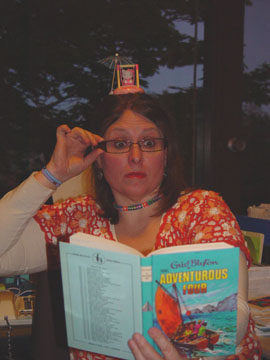If you are over 40 and leading a fairly busy, active life, it is possible that at least a few times you have had the experience of entering a room of your home and forgetting for what reason you went in there. This is a recurring theme in my life going way back, and since I tend to be easily distracted anyway – because I have a lot on my mind, thank you very much – ageing has only increased the frequency with which it occurs. I forget other stuff, too, though. Actually, forgetting is a way of life for me.
When I was a young woman, in my twenties and living in New York, I would routinely ask my friends to avoid patronising certain shops, restaurants, cafes and bars that had somehow offended me with their products or services. In this way, my support of local establishments worked similarly to U.S. foreign policy: sanctions were applied.
My two best friends would loyally oblige me, suspending their own patronage indefinitely, long after I had forgot both my request and the reason behind it – which happened in a matter of hours, probably.
Eventually it would come to pass that I would suggest a night out at Union Square Cafe, or The World Cafe, or some other establishment on our “Banned Places List.” Apparently, for my two friends, the List existed as a pristine, up-to-date, and fully accessible document in their bright and shiny minds. For me, it was more like a smudgy piece of cocktail napkin balled up in the handbag that is my brain.
(Insert long, silent stare.)
Me: “What?”
Friend 1: “We stopped going there months ago.”
Me: “We did? Why? I thought we liked going there. Anyway, I’ve been quite a few times lately and really enjoyed it. Why don’t you two want to go there?”
(Friend 1 sighs heavily and makes explicit “this again” eye contact with Friend 2.)
Friend 2: “We stopped going there back in February because you got angry at your waiter, and then complained that the cocktails were watery and the food sucked. You had a moral dilemma over whether or not you should be expected to leave a tip. Don’t you remember?”
Me: “Oh wow. No, not really. I thought I always liked their food. Don’t remember the thing with the waiter at all. Anyway, were you guys there with me?”
Friend 1: “No, we just took you at your word, which is why neither of us has been there in three months, thanks very much.”
Me: “Oh. Well, you know, it’s possible that I was drunk at the time I imposed that embargo. I guess I forgot. Sorry.”
(Insert longer, silenter stare.)
Me: “Uhmmm. So, would it be okay if we go there, anyway? They make a great Martini.”
My best friend, Sandra (Friend 2 in this scenario) will no doubt remember this dialogue better than me, possibly even verbatim. She will also remember the dates, the times, the frequency with which they occurred, and what each of us was wearing. As for me, I have had to make it up based on the bits and pieces I recall, pulling files from what my husband calls my “lateral memory” (not entirely sure what that means but I don’t think it’s a compliment).
So, I can’t really claim that my distractibility and memory lapses are something new and entirely age-related, but I can observe that it happens more these days, and that my tolerance is wearing thin.
The most common manifestation of my affliction happens like this. My loving husband, wondering through our kitchen, notices that the walk-in pantry’s light is on. He steps inside to turn it off, only to notice me standing inside, staring at the shelves’ contents as if I were at the Contemporary Art Museum admiring compelling installations of which I can make little sense. It probably does not help that I keep everything in this pantry: plates, pots, pans, tinned food and cleaning supplies, as well as anything else that I decide to shove in there.
Husband: “Hi, darling. Sorry, didn’t realise you were in there. I’ll leave the light on.”
Me: “Okay, thanks honey.”
He steps out, goes downstairs to fetch a part for something he’s working on, goes to the bathroom or where-have-you, and wanders back through the kitchen several minutes later, where he pays a visit to me again. Because I am still in the cupboard.
Husband: (steps in and kisses me) “You are still here.”
Me: “Yes.”
Husband: “Are you being a cupboard fairy? Or, did you forget what you came in here for?”
Me: “Yes, yes I did. But I am thinking it will come to me if I stand here long enough.”
Husband: (tries to help) “Well, maybe you were getting something out for dinner? It is nearly dinner time.”
Me: “Well, that sounds right. Yes. I was going to make dinner!”
(Husband smiles, pleased to have been useful.)
Me: “I wonder what I was planning to make?”
Husband: (even more gallantly) “You know, just some tinned herrings and rice would be fine with me. In fact, that sounds really good.”
Me: “I could do peas with that.”
Husband: (outdoes even himself) “That sounds great. Just what I want.”
Me: (operating on the cognitive level of a cocker spaniel, but happy to be freed from the pantry) “Excellent. I’ll just get those and be right out.”
Tiny memoir of today
Husband: (whilst eating cereal) “The AGE (local newspaper) wasn’t delivered today.”
Me: (tries to help) “Ah well, I will pick one up. I am going out anyway, and you have to get to your meeting. Do you need anything else? I am going to get some fresh fish for dinner, too, and I have to go by the library to pick up a book.”
Husband: “No, nothing else. But fish sounds good. Thanks, darling.”
We leave for our separate errands.
I am gone for approximately an hour and arrive back home with these items: a large tub of plain yoghurt, a punnet of strawberries, a carton of our favourite eggs and a packet of organic, biodynamic almonds (which fascinate me, because they sound magical). Clearly, a second trip will be required, since I have not landed the fish I promised for dinner, delivered The AGE that was missed this morning, or retrieved that book that I really do need from the library. About the time I am realising this, my husband phones me.
Me: “Hi, honey! How was the meeting?”
Husband: “Very good. It’s all working out well, and I am just about to head off to go to pick up that printer I purchased on-line. I thought I’d check to see if you need anything.”
Me: (too embarrassed to say I forgot everything) “No, nothing, thanks. I was just about to pop out myself … for some more stuff.”
I leave again. I am pleased that the fish market has two fresh snappers but the newsagent has sold out of our usual newspaper so I have to buy an alternative one. I stop at the bakery, where I request a loaf of bread, ask for it to be sliced, pay for it and then leave – without the bread, of course.
As I am turning round to go back for it, I come face to face with someone very familiar, yet I am quickly overcome by that awful feeling you get when your facial-recognition software sends up a “this person is out of context and cannot be identified” alarm. I manage this awkwardness badly, by saying nothing, moving past the mystery woman, and fetching my bread from the counter. She looks right at me and seems puzzled, but keeps walking and says nothing herself.
And that’s when I know. She can’t remember who I am, either! Perhaps oddly, this makes me happy. I feel a warm sense of solidarity with this stranger.
As I reach the parking lot, the software finally connects the face to its usual context and I remember that of course I feel solidarity with her, because she is my hairdresser. I have seen her professionally on two occasions over the past few months. I have spoken to her extensively about her life, her family, her children and her relatives from Greece. She knows all about how I met my husband, why I came to live in Australia, what I do for a living, and why I don’t dye my hair. She knows that, being American, I always grapple with whether and how much to tip my hairdresser, and she can rest assured that I will never place her under any kind of sanction, or tell my friends not to go to her salon.
On the one hand, it is possible that we are both going to feel embarrassed about this the next time I make a booking to get my hair done. On the other hand, it is even more possible that we will both have forgot it happened.


